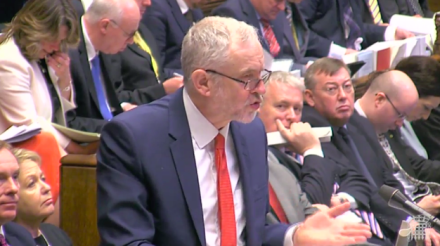
We are starting to see a bit of a different Jeremy Corbyn. We kind of saw it at PMQs last week, and his appearance at Monday’s PLP meeting was notable largely for the fact that it was less notable than normal. Both could be attributed to a leader more confident in his position.
Today was probably one of his best performances at the despatch box. Once again, he devoted six questions to a single topic, and once again he didn’t use any crowdsourced questions (the, I think mistaken, decision to quote children from a recent school visit doesn’t really count).
Instead what he crowdsourced were criticisms of the Government policy he chose to focus on: the forced academisation of schools. And these criticisms worked because they were taken from Cameron’s own MPs.
Corbyn’s short, opening question indicated that he made a sensible decision in choosing his attack line. He asked: “Could the PM explain why he’s intent on forcing good and outstanding schools to become academies?”
Rather than stick to an ideological point about flatly opposing academy schools, he took up a specific practical position about the enforced roll-out of the scheme to all schools. This meant that Cameron’s predictable retort – that people opposed to free schools want to change the way successful schools are run and keep failing schools as they are – did not work. The only person proposing that was him.
It also meant that Corbyn’s argument was wide enough that he could incorporate Tory criticisms into the attack. Tory MPs Graham Stuart, Will Quince and Graham Brady were all used by the Labour leader to turn the screw on Cameron, as was former Tory Education Secretary Kenneth Baker and even a Conservative councillor in Cameron’s own seat.
“Why on earth is the PM proposing to spend £1.3bn on a top-down reorganisation that wasn’t in his manifesto?” Corbyn wrapped up his questions by asking. “Even his own MPs and councillors don’t want it. Can’t he just think again?”
Two months ago, I wrote about my concern that Corbyn wasn’t making the most of Tory splits over Europe, and that he “simply can’t let internal Labour disputes affect his ability to hold the Government to account”. It is perhaps indicative of the two months Cameron has endured that Corbyn now has the confidence to raise the lack of support the PM is getting from his own benches.
However, while this was a good half hour for Corbyn, it wasn’t brilliant, and he is still facing a competent Commons performer across the despatch box. What we saw from him today – focussed attack lines, embarrassing quotes, a forethought into what rebuttals Cameron might use – should be the minimum expectation for PMQs, not the best we can hope for.




More from LabourList
Ashley Dalton resigns as health minister for cancer treatment
Paul Nowak column: ‘Labour must focus on the basics’
‘Labour’s two-child cap victory rings hollow while asylum-seeking children remain in poverty’